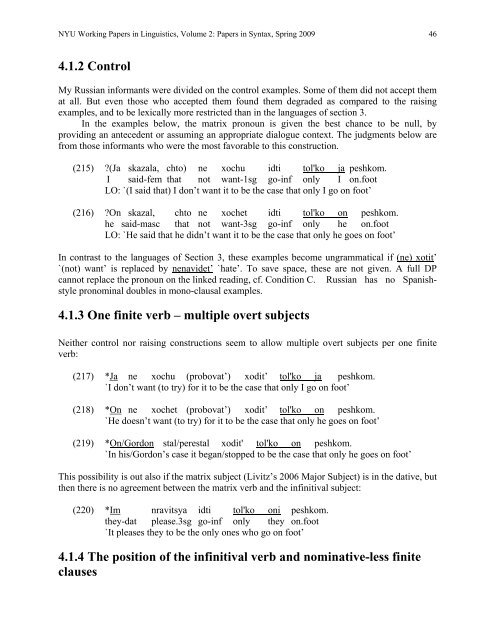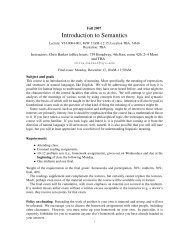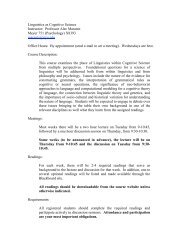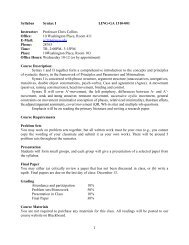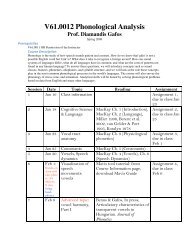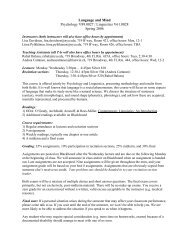Overt Nominative Subjects in Infinitival Complements Cross - NYU ...
Overt Nominative Subjects in Infinitival Complements Cross - NYU ...
Overt Nominative Subjects in Infinitival Complements Cross - NYU ...
Create successful ePaper yourself
Turn your PDF publications into a flip-book with our unique Google optimized e-Paper software.
<strong>NYU</strong> Work<strong>in</strong>g Papers <strong>in</strong> L<strong>in</strong>guistics, Volume 2: Papers <strong>in</strong> Syntax, Spr<strong>in</strong>g 2009 464.1.2 ControlMy Russian <strong>in</strong>formants were divided on the control examples. Some of them did not accept themat all. But even those who accepted them found them degraded as compared to the rais<strong>in</strong>gexamples, and to be lexically more restricted than <strong>in</strong> the languages of section 3.In the examples below, the matrix pronoun is given the best chance to be null, byprovid<strong>in</strong>g an antecedent or assum<strong>in</strong>g an appropriate dialogue context. The judgments below arefrom those <strong>in</strong>formants who were the most favorable to this construction.(215) ?(Ja skazala, chto) ne xochu idti tol'ko ja peshkom.I said-fem that not want-1sg go-<strong>in</strong>f only I on.footLO: `(I said that) I don’t want it to be the case that only I go on foot’(216) ?On skazal, chto ne xochet idti tol'ko on peshkom.he said-masc that not want-3sg go-<strong>in</strong>f only he on.footLO: `He said that he didn’t want it to be the case that only he goes on foot’In contrast to the languages of Section 3, these examples become ungrammatical if (ne) xotit’`(not) want’ is replaced by nenavidet’ `hate’. To save space, these are not given. A full DPcannot replace the pronoun on the l<strong>in</strong>ked read<strong>in</strong>g, cf. Condition C. Russian has no Spanishstylepronom<strong>in</strong>al doubles <strong>in</strong> mono-clausal examples.4.1.3 One f<strong>in</strong>ite verb – multiple overt subjectsNeither control nor rais<strong>in</strong>g constructions seem to allow multiple overt subjects per one f<strong>in</strong>iteverb:(217) *Ja ne xochu (probovat’) xodit’ tol'ko ja peshkom.`I don’t want (to try) for it to be the case that only I go on foot’(218) *On ne xochet (probovat’) xodit’ tol'ko on peshkom.`He doesn’t want (to try) for it to be the case that only he goes on foot’(219) *On/Gordon stal/perestal xodit' tol'ko on peshkom.`In his/Gordon’s case it began/stopped to be the case that only he goes on foot’This possibility is out also if the matrix subject (Livitz’s 2006 Major Subject) is <strong>in</strong> the dative, butthen there is no agreement between the matrix verb and the <strong>in</strong>f<strong>in</strong>itival subject:(220) *Im nravitsya idti tol'ko oni peshkom.they-dat please.3sg go-<strong>in</strong>f only they on.foot`It pleases they to be the only ones who go on foot’4.1.4 The position of the <strong>in</strong>f<strong>in</strong>itival verb and nom<strong>in</strong>ative-less f<strong>in</strong>iteclauses


